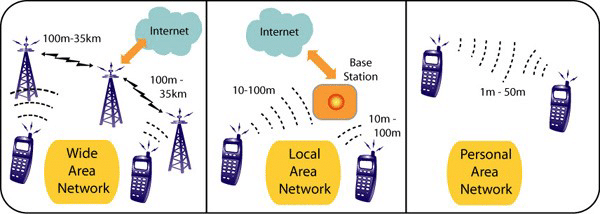
Welcome to the digital age, where staying connected has become an integral part of our everyday lives. Whether it’s for work, entertainment, or simply keeping in touch with loved ones, a reliable and secure internet connection is a must-have. And at the heart of this connectivity lies something called SSID.
You may have heard this term before but wondered what exactly it means and why it’s important. Well, fret not! In today’s blog post, we’ll unravel the mystery behind SSID and explore how you can protect your WiFi network in 2023.
So if you’re ready to dive into the world of wireless networks and safeguard your online presence like a pro, let’s get started! By understanding what SSID is all about and implementing some effective security measures, you’ll be well on your way to enjoying uninterrupted internet bliss while keeping prying eyes at bay. Let’s go!
What is SSID for Wifi?
SSID stands for Service Set Identifier. In simple terms, it is the name of your WiFi network that allows devices to connect and communicate with each other wirelessly. Think of it as a unique identifier or label assigned to your network.
When you set up a WiFi network at home or in an office, you give it a distinct name, which becomes its SSID. This name could be anything you choose – from something generic like “HomeWiFi” to something more personalized like “SmithFamilyNetwork.”
The SSID plays a crucial role in connecting your devices to the correct wireless network amidst all the other networks that may be available nearby. It acts as a beacon, broadcasting its presence so that your smartphone, laptop, or any other device can detect and connect to it.
Having an easily recognizable SSID also makes it convenient for guests or visitors who need access to your WiFi. Instead of sharing complicated passwords, they can simply select your network from their list of available options and enter the password if required.
In addition to providing connectivity convenience, the SSID also serves as one layer of security for your network. By keeping this identifier hidden (known as hiding the SSID), you add an extra level of protection against potential unauthorized access attempts.
Now that we have delved into what exactly SSID is and why it matters let’s move on to exploring how you can protect this vital component of your WiFi setup in 2023!
How to protect SSID in 2023?
 In today’s digital age, protecting your SSID (Service Set Identifier) is crucial to ensure the security and privacy of your WiFi network. With cyber threats becoming increasingly sophisticated, it’s important to stay one step ahead in safeguarding your wireless connection. Here are some tips on how to protect your SSID in 2023:
In today’s digital age, protecting your SSID (Service Set Identifier) is crucial to ensure the security and privacy of your WiFi network. With cyber threats becoming increasingly sophisticated, it’s important to stay one step ahead in safeguarding your wireless connection. Here are some tips on how to protect your SSID in 2023:
1. Change the Default SSID: Most routers come with a default SSID, which can make it easier for hackers to identify and target your network. By changing this identifier to something unique and unrelated to personal information or location, you can add an extra layer of protection.
2. Enable Network Encryption: Utilize strong encryption protocols such as WPA2 or WPA3 for securing data transmission over your WiFi network. This will prevent unauthorized access by encrypting the communication between devices.
3. Use a Strong Password: Create a strong password consisting of a mix of uppercase and lowercase letters, numbers, and special characters for both your router login credentials and WiFi network password.
4. Disable Remote Management: Disable remote management options on your router settings as this can be exploited by attackers trying to gain control over your network remotely.
5. Enable MAC Address Filtering: MAC address filtering allows you to specify which devices are allowed access to your WiFi network based on their unique hardware addresses.
By implementing these measures along with regularly updating firmware and keeping antivirus software up-to-date on all connected devices, you can significantly enhance the security of your SSID in 2023 and beyond!
The Different Types of Wifi Networks

When it comes to wifi networks, there are several different types that you may encounter. Understanding the differences between them can help you make informed decisions about which network is best for your needs.
One common type of wifi network is the public network. These are often found in places like coffee shops, airports, and hotels. Public networks allow multiple users to connect simultaneously, but they may not always be secure.
Another type of wifi network is a home or personal network. This is typically set up in someone’s residence and allows for private internet access. Home networks require a password to connect, providing an added layer of security.
Enterprise or business networks are another category of wifi networks. These are designed to support larger numbers of users and provide more advanced features like guest access, VLANs (Virtual Local Area Networks), and centralized management tools.
Mesh networks have gained popularity in recent years as well. They use multiple devices spread throughout an area to create a seamless wifi coverage zone without any dead spots.
There are mobile hotspots that allow you to connect your devices to the internet using cellular data instead of traditional wired connections.
Each type has its own advantages and disadvantages depending on your specific needs. It’s important to consider factors such as speed, security, ease of use, and cost when choosing the right wifi network for you.
Pros and Cons of a Wifi Network
Wifi networks have become an essential part of our daily lives, providing us with the convenience of connecting to the internet wirelessly. However, like any technology, there are both advantages and disadvantages to using a wifi network.
One of the main benefits of a wifi network is its flexibility. With wifi, you can connect multiple devices to the internet without any physical connection. This means you can move around your home or office freely while staying connected. It allows for seamless integration with various devices such as smartphones, laptops, and smart home appliances.
Another advantage is the speed that wifi networks offer. Compared to other types of wireless connections like Bluetooth or cellular data, wifi provides faster data transfer rates. This makes it ideal for activities that require high bandwidth such as streaming movies or playing online games.
Additionally, setting up a wifi network is relatively easy and cost-effective compared to wired alternatives like Ethernet cables. All you need is a router and compatible devices to start enjoying wireless connectivity.
However, there are also some drawbacks associated with using a wifi network. One major concern is security. Since wifi signals can be accessed within range by anyone nearby unless properly secured, it’s important to take measures such as setting strong passwords and enabling encryption protocols (like WPA2) to protect your network from unauthorized access.
Another disadvantage is signal interference or congestion in densely populated areas where many people are using similar frequencies for their own networks or electronic appliances causing potential disruptions in connectivity.
Although convenient when working correctly, if there are issues with your router or environmental factors like distance from the router or obstacles blocking the signal path (such as walls), it may result in slower speeds or weak connections which can be frustrating.
Despite these downsides when proper precautions are taken into account – securing your network properly and optimizing its performance – having a reliable WiFi connection undoubtedly offers numerous benefits that greatly outweigh any potential drawbacks.
How to Choose a Wifi Network

When it comes to choosing a wifi network, there are several factors that you should consider. One of the most important things to look at is the network’s security features. You want to make sure that the network you connect to has strong encryption protocols in place, such as WPA2 or WPA3, which will help protect your data from being intercepted by hackers.
Another factor to consider when choosing a wifi network is its speed and reliability. Look for networks that offer high-speed connections and have a good track record of uptime. This way, you can be confident that you’ll be able to access the internet quickly and without interruption.
It’s also worth considering whether or not the wifi network requires a password for access. While open networks may seem convenient, they also pose a higher risk of unauthorized access. Opting for networks with password protection will provide an additional layer of security.
Furthermore, take into account any additional features or services offered by the wifi network provider. Some providers may offer parental controls or content filtering options, which can be useful if you have children using the internet at home.
Read reviews and ask for recommendations from friends or colleagues who have used different wifi networks. Their experiences can give you valuable insights into what to expect from various providers.
By carefully considering these factors and doing some research beforehand, you’ll be able to choose a wifi network that meets your needs in terms of security, speed, reliability, and additional features
Alternatives to Wifi Networks
In today’s digital age, staying connected is more important than ever. While Wifi networks are the most common way to access the internet, they may not always be available or reliable. Thankfully, there are alternatives to traditional Wifi networks that can help you stay connected in various situations.
One alternative to Wifi networks is mobile data. With the widespread availability of smartphones and data plans, you can easily use your cellular network to connect to the internet on the go. This option is especially convenient when traveling or in areas where Wifi signals are weak.
Another alternative is Ethernet connections. Ethernet cables provide a direct and stable connection between your device and a router or modem. This wired connection eliminates any interference or signal loss that may occur with wireless networks.
Powerline adapters offer another solution for accessing the internet without relying solely on Wifi. These devices use your home’s electrical wiring to transmit data signals from one room to another, creating a wired-like connection throughout your house.
Satellite internet is yet another alternative for those living in rural or remote areas where traditional broadband options may be limited. Satellite dishes receive signals from satellites orbiting Earth and allow users to access the internet regardless of their location.
Public hotspots can serve as an alternative when you’re out and about but don’t have access to your own personal network. Many cafes, restaurants, libraries, and other public spaces offer free Wifi hotspots for patrons.
While these alternatives provide different ways of connecting to the internet outside of traditional Wifi networks, each has its own pros and cons depending on factors such as speed, reliability, cost, and convenience. Exploring these options allows you to find what works best for your specific needs in different situations
How to protect Wifi Network using VPN?
One of the most effective ways to safeguard your Wifi network is by using a Virtual Private Network (VPN). A VPN creates a secure and encrypted connection between your device and the internet, ensuring that any data transmitted over the network is protected from potential hackers or eavesdroppers.
To set up a VPN for your Wifi network, you first need to choose a reputable VPN service provider. There are many options available in the market, so it’s important to do thorough research before making a decision. Look for providers that offer strong encryption protocols, multiple server locations, and user-friendly apps.
Once you have selected a VPN provider, you will need to install their app on your device. Most reputable providers offer apps for various operating systems including Windows, Mac, Android, and iOS. After installing the app, simply launch it and follow the prompts to connect to one of their servers.
By connecting through a VPN server, all your internet traffic will be routed through an encrypted tunnel. This means that even if someone manages to intercept your data packets while connected to your Wifi network, they won’t be able to decipher them without the encryption key provided by the VPN.
In addition to encrypting your data traffic, using a VPN also helps protect against other security threats such as DNS hijacking or Man-in-the-Middle attacks. With these advanced features in place, you can browse safely knowing that your online activities are shielded from prying eyes.
However, it’s important to keep in mind that while a VPN provides an extra layer of security for your Wifi network, it is not foolproof.
The effectiveness of any security measure depends on various factors including how well it is implemented and maintained.
So, it’s still crucially important to follow best practices for securing your Wifi networks as choosing a strong password, enabling firewall protection, and regularly updating your router firmware, to ensure comprehensive security of your network.
Best VPN for Wifi SSID
HideIPVPN offers a VPN service with military-grade encryption, and high-speed servers with unlimited bandwidth.
Our service comes with shared IP addresses so that your activity can never be tied to one particular user, further protecting your privacy.

We also offer DNS leak protection, a Kill Switch, the latest VPN protocols, and a guaranteed no-log policy.
Best VPN Deal! Get HideIPVPN for $2.7/mo!
Every purchase you make comes with a 30-day money-back guarantee.
Conclusion
In today’s digital age, having a secure and protected WiFi network is crucial. The SSID plays a significant role in defining your network and ensuring its security. By understanding what an SSID is and implementing the right measures to protect it, you can safeguard your WiFi network from potential threats.
Remember that there are different types of WiFi networks available, each with its own pros and cons. Take the time to evaluate your needs and choose the most suitable option for your specific requirements.
If you’re concerned about privacy when using public WiFi networks or want an extra layer of security at home, consider using a VPN (Virtual Private Network). A VPN encrypts your online traffic, making it virtually impossible for hackers or malicious actors to intercept sensitive information.
By following these steps, you can ensure that your SSID remains protected in 2023 and beyond. Stay vigilant by regularly updating passwords, enabling encryption protocols, and keeping an eye out for any suspicious activity on your network.
So don’t wait any longer – take action now to secure your WiFi network! Protecting your SSID will give you peace of mind knowing that only authorized users have access to your connection. Safeguarding against potential threats will keep both personal data and devices safe from harm.
Remember: knowledge is power when it comes to protecting yourself online. Stay informed about the latest advancements in technology as well as the best practices for securing wireless networks and ssid wifi. With a little effort upfront, you can enjoy seamless connectivity while keeping cybercriminals at bay!
Stay connected safely!



